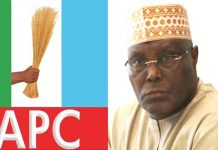By Alhassan Farouk
There has been several attempts to rationalize the divisive – and now obvious – plot by some power-crazed northern oligarchs to retain the presidency in the northern region following the eight years of Muhammadu Buhari, a man who did little to foster national unity and would leave behind a legacy marred by allegations of naked nepotism.
Of them all, the one that has held consistent and has been repeatedly put forward by the foot soldiers willing to stake their reputation for a political betrayal and self-absorption that could further weaken the country’s union and jeopardize its continued existence as a single entity, is the claim that a northern candidate offers the brightest chance of victory for either of the two major political parties in 2023.
The reasoning, often portrayed as pragmatic, is that the northern region’s share of the population makes its endorsement crucial to electoral victory in national elections and if it takes a northern candidate to appease the region and obtain its endorsement, then other concerns, including Nigeria’s founding principles of equity, must take the backseat in the pursuit of this “win-at-all-cost” strategy.
This servile approach, which canonizes the interests of a single group in a multi-ethnic country and encourages the perpetual indulgence of their unfettered appetite for power, ignores the political realities of Nigeria and replaces that reality with a simplistic caricature in which the north, all 19 states of it, is reduced to a single monolith ever marching in one direction and with the power to single-handedly determine the presidency.
If that were true, Muhammadu Buhari would have been elected president in 2003, 2007, 2011 – his three previous unsuccessful attempts despite his popularity in the north and mythical 12-million vote deposit. His defeat on those occasions serve to prove a point: that the north is not a monolith, for Buhari was routinely rejected in northern states such as Kebbi, Plateau, Nassarawa and Taraba, due to historical reasons that may prove too elaborate to dissect in this essay.
The other point is that the north, as a single bloc, is incapable of determining the presidency. This is both a numerical and constitutional reality. To win the Presidency, candidates are required to secure a degree of acceptance in all regions of the country with the mandated 25 percent of votes in at least 24 states of the country’s 36. Failure to secure this before 2015 hobbled Buhari’s bid and reduced him to a sectional figure, appealing only to an enclosed group.
The dynamics remain unchanged and an understanding of it makes clear that a dismissal of southern interests in favor of yet another northern candidate is neither pragmatic nor wise. Rather the quickest route to defeat.
Equally concerning – and in fact dangerous – is the message that such an outcome would communicate. The message that the northern region is to be pacified and the south treated with casual disdain. Nigeria cannot survive such conceit and insensitivity, not when secessionist calls, based on perceived oppression and lack of inclusion, have rattled the federation and refocused attention on the country’s future.
It is also worth highlighting the hypocrisy of those who, in 2015, rallied against Goodluck Jonathan on the basis that he betrayed a zoning arrangement, but now regard the term “zoning” as a strange, unfamiliar concept in Nigeria’s politics.
They argue, dubiously, that emphasis should be on competence, as if there was ever a time leadership selection, and pretty much the allocation of national resources, has even been conducted in Nigeria without serious care for equity and balance.
Seeking legitimacy for their power greed and lack of consideration, they present their schemes as that of “the people”, with the pretension that only a northerner can satisfactorily protect the interests of the north. But for all his clannishness, under the watch of Muhammadu Buhari, banditry has emptied communities in the north, with non-state actors successfully carving out enclaves where they reign supreme.
Despite spending the most time in charge of the country, whether as military dictators or democratically elected leaders, the northern oligarchs have failed to translate their self elevation to meaningful development in their region, which continues to lag in welfare and social development indexes.
Nigeria, all regions of her, does not exist to massage the ego of a few men who think governance and control of others is their exclusive right. We cannot sacrifice opportunities for progress, or downgrade the legitimate aspirations of others, because some people cannot stomach the idea that in a plural democracy, stability and success is impossible without mutual compromise and inclusion.




